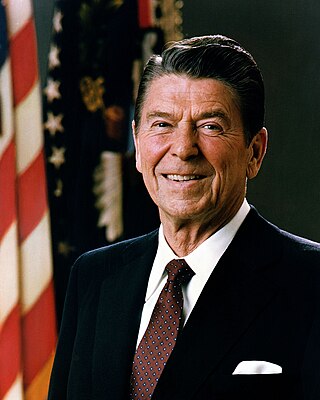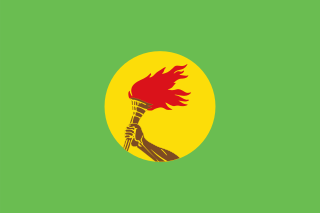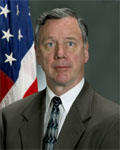| |||||
| Decades: | |||||
|---|---|---|---|---|---|
| See also: | History of Zaire | ||||
The following lists events that happened during 1983 in Zaire .
| |||||
| Decades: | |||||
|---|---|---|---|---|---|
| See also: | History of Zaire | ||||
The following lists events that happened during 1983 in Zaire .
| Date | Event |
|---|---|
| 4 August | President Ronald Reagan of the United States meets President Mobutu Sese Seko in the Oval Office. [1] |

The Iran–Contra affair, often referred to as the Iran–Contra scandal, or simply Iran–Contra, was a political scandal in the United States that occurred during the second term of the Reagan administration. Between 1981 and 1986, senior administration officials secretly facilitated the sale of arms to Iran, which was the subject of an arms embargo. The administration hoped to use the proceeds of the arms sale to fund the Contras, a right-wing rebel group, in Nicaragua. Under the Boland Amendment, further funding of the Contras by government appropriations had been prohibited by Congress, but the loophole was to use non-appropriated funds.

Ronald Wilson Reagan was an American politician and actor who served as the 40th president of the United States from 1981 to 1989. A member of the Republican Party, his presidency constituted the Reagan era, and he is considered one of the most prominent conservative figures in American history.

Zaire, officially the Republic of Zaire, was the name of the Democratic Republic of the Congo from 1965 to 1997. Zaire was located in Central Africa and was, by area, the third-largest country in Africa, and the 11th-largest country in the world. With a population of over 23 million inhabitants, Zaire was the most populous officially Francophone country in Africa, as well as one of the most populous in Africa.

Edwin Meese III is an American attorney, law professor, author and member of the Republican Party who served in Ronald Reagan's gubernatorial administration (1967–1974), the Reagan presidential transition team (1980–81), and the Reagan administration (1981–1985). Following the 1984 presidential election, Reagan considered him as White House Chief of Staff, but James Baker was chosen instead. Meese was eventually appointed and confirmed as the 75th United States Attorney General (1985–1988), a position he held until resigning in 1988 amidst the Wedtech scandal.

Mobutu Sese Seko Kuku Ngbendu wa za Banga, commonly known as Mobutu Sese Seko or simply just Mobutu, was a Congolese politician and military officer who was the president of Zaire from 1965 to 1997. He also served as Chairman of the Organisation of African Unity from 1967 to 1968. During the Congo Crisis, Mobutu, serving as Chief of Staff of the Army and supported by Belgium and the United States, deposed the democratically elected government of left-wing nationalist Patrice Lumumba in 1960. Mobutu installed a government that arranged for Lumumba's execution in 1961, and continued to lead the country's armed forces until he took power directly in a second coup in 1965.

The National Union for the Total Independence of Angola is the second-largest political party in Angola. Founded in 1966, UNITA fought alongside the Popular Movement for the Liberation of Angola (MPLA) in the Angolan War for Independence (1961–1975) and then against the MPLA in the ensuing civil war (1975–2002). The war was one of the most prominent Cold War proxy wars, with UNITA receiving military aid initially from the People's Republic of China from 1966 until October 1975 and later from the United States and apartheid South Africa while the MPLA received support from the Soviet Union and its allies, especially Cuba.

Robert Carl "Bud" McFarlane was an American Marine Corps officer who served as National Security Advisor to President Ronald Reagan from 1983 to 1985. Within the Reagan administration, McFarlane was a leading architect of the Strategic Defense Initiative, a project intended to defend the US from Soviet ballistic missile attacks. He resigned as National Security Adviser in late 1985 because of disagreements with other administration figures but remained involved in negotiations with Iran and with Hezbollah.
The 1980 October Surprise theory refers to an allegation that representatives of Ronald Reagan's presidential campaign made a secret deal with Iranian leaders to delay the release of American hostages until after the election between Reagan and President Jimmy Carter, the incumbent. The detention of 66 Americans in Iran, held in hostage since November 4, 1979, was one of the leading national issues during 1980, and the alleged goal of the deal was to thwart Carter from pulling off an "October surprise". Reagan won the election, and, on the day of his inauguration—minutes after he concluded his 20-minute inaugural address—the Islamic Republic of Iran announced the release of the hostages.

The 9th G7 Summit was held at Williamsburg, Virginia, United States between May 28 and 30, 1983. The venue for the summit meetings was Colonial Williamsburg in Virginia.
The main goal of the US foreign policy during the presidency of Ronald Reagan (1981–1989) was winning the Cold War and the rollback of communism—which was achieved in the Revolutions of 1989 in Eastern Europe during 1989; in the German reunification in 1990; and in the dissolution of the Soviet Union in 1991. Historians debate whom to credit, and how much. They agree that victory in the Cold War made the U.S. the world's only superpower, one with good relations with former communist regimes in Russia and Eastern Europe.
Mobutu Sese Seko's foreign policy emphasized his alliance with the United States and the Western world while supposedly maintaining a non-aligned position in international affairs. Mobutu ruled the Republic of the Congo and then Zaire as president for 32 years, from 1965 to 1997.
In the 1980s in Angola, fighting spread outward from the southeast, where most of the fighting had taken place in the 1970s, as the African National Congress (ANC) and SWAPO increased their activity. The South African government responded by sending troops back into Angola, intervening in the war from 1981 to 1987, prompting the Soviet Union to deliver massive amounts of military aid from 1981 to 1986. The USSR gave the Angolan government over US$2 billion in aid in 1984. In 1981, newly elected United States President Ronald Reagan's U.S. assistant secretary of state for African affairs, Chester Crocker, developed a linkage policy, tying Namibian independence to Cuban withdrawal and peace in Angola.
This article deals with the activities of the U.S. Central Intelligence Agency (CIA) in Angola. The list of activities may be incomplete due to the clandestine nature of the subject matter.

Charles R. Black Jr. is an American lobbyist and businessman, who is the Founding Chairman of Prime Policy Group, a public affairs firm which is now a subsidiary of Burson Cohn & Wolfe. Prime Policy Group was formed with the merger of Martin B. Gold's Gold & Liebengood with the Washington, DC-based lobbying firm he co-founded—BMSK—with Paul Manafort, Roger J. Stone, and Peter G. Kelly. In 2010, Black was inducted into the American Association of Political Consultants (AAPC) Hall of Fame.

Thomas E. "Ted" McNamara is a United States diplomat and State Department official.

The 1983 State of the Union Address was given by the 40th president of the United States, Ronald Reagan, on January 25, 1983, at 9:00 p.m. EST, in the chamber of the United States House of Representatives to the 98th United States Congress. It was Reagan's second State of the Union Address and his third speech to a joint session of the United States Congress. Presiding over this joint session was the House speaker, Tip O'Neill, accompanied by George H. W. Bush, the vice president.
The presidency of Ronald Reagan began on January 20, 1981, when Ronald Reagan was inaugurated as the 40th president of the United States, and ended on January 20, 1989.

The Governors Island Summit was a summit meeting between U.S. President Ronald Reagan and General Secretary of the Communist Party of the Soviet Union Mikhail Gorbachev. It was held on December 7, 1988. U.S. Vice President and President-elect George H. W. Bush was also in attendance.

Gerhard Herder is a former German diplomat who served as an ambassador for East Germany to Lebanon and to the United States from 1983 until 2 October 1990, following the collapse of the GDR.